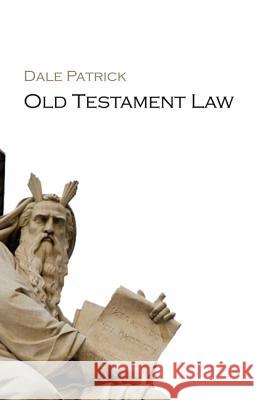Old Testament Law » książka
Old Testament Law
ISBN-13: 9781610972413 / Angielski / Miękka / 2011 / 292 str.
Dale Patrick examines the first five books of the Bible--the Pentateuch--the Law. He provides an effective method for studying and understanding this vital part of the canon. His introduction concentrates on the exposition of the major thrust of Old Testament Law: the Ten Commandments, the Book of the Covenant, the Deuteronomic Law, the Holiness Code, and the Priestly Law. Law--rules and regulations, concepts and principles, legal codes--written and unwritten. Patrick tackles important questions surrounding the formation of the Law. What is the Law? How was it formulated? What implications does the Law of the Israelites have for Christians today? Patrick's deft handling and answering of these questions results in a book that provides a means to understand the specific rules governing the concepts and principles of the written law so that we may grasp the unwritten law; i.e., the justice, righteousness, and holiness required by God. Patrick offers critical exposition in a format that makes a seemingly difficult and esoteric part of the Bible accessible to the reader. This introductory text serves as a springboard to further study. Dale Patrick was appointed to the faculty at Drake University in 1985. He continued at Drake until retirement in 2008. Since retiring, he and his wife have been teaching at United Theological College, Harare, Zimbabwe, as volunteers in mission.
Dale Patrick examines the first five books of the Bible--the Pentateuch--the Law.He provides an effective method for studying and understanding this vital part of the canon. His introduction concentrates on the exposition of the major thrust of Old Testament Law: the Ten Commandments, the Book of the Covenant, the Deuteronomic Law, the Holiness Code, and the Priestly Law.Law--rules and regulations, concepts and principles, legal codes--written and unwritten. Patrick tackles important questions surrounding the formation of the Law. What is the Law? How was it formulated? What implications does the Law of the Israelites have for Christians today? Patricks deft handling and answering of these questions results in a book that provides a means to understand the specific rules governing the concepts and principles of the written law so that we may grasp the unwritten law; i.e., the justice, righteousness, and holiness required by God.Patrick offers critical exposition in a format that makes a seemingly difficult and esoteric part of the Bible accessible to the reader. This introductory text serves as a springboard to further study.Dale Patrick was appointed to the faculty at Drake University in 1985. He continued at Drake until retirement in 2008. Since retiring, he and his wife have been teaching at United Theological College, Harare, Zimbabwe, as volunteers in mission.











